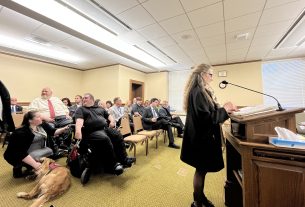|
Getting your Trinity Audio player ready...
|
Thinking about grades, sports, girl/boyfriends, and maybe a trip abroad before enlistment, they graduated from high school only a few years ago.
Today, these highly motivated men and women – graduates of the Israel Defense Forces’ Bahad 10 Training Base (Medical Corps School) – think obsessively about saving the lives of fellow soldiers and civilians by stopping bleeding, relieving pain, and treating the physical trauma of the wounded. They wouldn’t admit it, but they are heroes.
Early on the accursed Shabbat of October 7, teams were awakened by messages from medical officers of “something big, something unusual” that required them to rush to a base in the South and treat large numbers of wounded soldiers and civilians. Taking with them their medical equipment that is always ready for use, they raced to their mission and were shocked by the unprecedented number of people who needed their urgent care.
The IDF Medical Corps: Who are they?
Located in Tzrifin until September 2015, Bahad 10 was then transferred to “Bahad City” in the Negev for training for all medical positions needed in the IDF. Its current commander is Lt.-Col. Miki Almakias.
Every year, thousands of soldiers interested in becoming paramedics, combat and general emergency medical technicians (EMTs), registered nurses, mental-health officers, ambulance drivers, dental assistants, and more, take courses for up to 14 months at Bahad 10. The proportion of male and female trainees is about equal. Some go on afterward to study for a degree in medical school, while others continue in the IDF as reservists. The courses are taught by senior expert doctors, paramedics, and EMTs, most of whom are Bahad 10 graduates.
It isn’t a medical school teaching students to become MDs – the Israeli universities do that. The Hebrew University-Hadassah Medical Faculty has a special program for preparing medical students to serve in the military; Magen David Adom (MDA) and United Hatzalah (UH) train people to be paramedics and EMTs. But Bahad 10 is the only Israeli facility that trains people for military service in these specialties.
Thirteen years ago, Bahad 10 was accredited by the prestigious American Association of Surgeons and is the only body of its kind in Israel that holds such an American license. The facility has a simulation center – one of the largest in Israel that enables trainees to practice procedures on real-looking dummies whose “bodies” react like those of humans.
BAHAD 10 Company Commander Capt. Barak Mahdoon, a 25-year-old raised in Rehovot who lives in Ashkelon, is in charge of 100 people. In one of The Jerusalem Post’s four interviews with Bahad 10 soldiers, he recalled: “I woke up at home. Sirens were screaming. I called officers who work for me and tried to calm them down.”
His team arrived at the base in the South at around 9.30 a.m., about three hours after the Hamas terrorist infiltration. Seventeen teams of five got to work treating some 90 wounded soldiers and civilians, women, children, the disabled, and the elderly. “We witnessed very difficult things. Our people were under fire. But we did what we were trained to do – applying tourniquets, administering pain medication, and tying bandages. The bread-and-butter of paramedics and EMTs is to stop bleeding, and we spend months in Bahad 10 learning the various techniques.”
What they saw was acutely traumatic, but Bahad 10 graduates are taught to work professionally without allowing emotions to take over at catastrophic events. All the teams are brought quickly to talk in small groups with commanders and mental-health officers to relate what they saw, describe their feelings, and prevent the development of post-traumatic stress disorder. Mahdoon said that “the women in the teams were as strong emotionally as the men. No one suffered acute trauma, and all were ready to return to their work. Our teams trust their commanders. We had many heart-to-heart discussions. We know what our enemy is like – lacking human values. They are our opposites. Our people are ethical, humane, strong, and united.”
SGT. EVIATAR KIRSHENBOIM, a 21-year-old Bahad 10 paramedic from Rishon Lezion who graduated from his course two years ago, told the Post that he will soon begin teaching around 50 others.
“Like hi-tech professionals, we always try to learn new things and update ourselves. After going out on missions to treat the wounded and sick, we always meet, examine statistics, and try to reach conclusions – and suggest how to do things even better.” He was at his Negev base on the day of the Hamas incursion (launched at 6.30 a.m.).
“I got a call at 7.30 a.m. from a good friend who was also on weekend duty. He said that, apparently, we have to prepare because we are being brought in on an emergency. We got into our military ambulances and were the first military medical force to arrive at the base in the South where the wounded were brought. We had all our equipment – which is always ready, even for the most extreme events, but since so many needed treatment, we had to call for replenishment, and everything was brought to us.”
According to instructions they received, almost all the wounded they treated were transported to Soroka-University Medical Center in Beersheba because it’s a tertiary medicine center, with some of the less-seriously hurt going to Barzilai Medical Center in Ashkelon.
Kirshenboim said he is used to being at home one weekend, and then at Bahad 10 the following week. His father – who works in marketing at a hi-tech company – and his mother – who teaches sports to special-needs children – worry about him, of course, but “I tell them that I am protected with people who back me up, so they shouldn’t be concerned.”
After the teams had finished treating the wounded for several days, they returned to Bahad 10 for debriefing and emotional support. “We got all the help we needed in our talks. We knew that our professions involve dealing with the seriously wounded. We have a holy mission; and we felt strong. We are now united as a people.”
SGT. ARIEL YALONENSKY, a 20-year-old Haifa resident and EMT, has a physician role-model in his family. His father, Sergei, is a cardiologist; his mother an English teacher who made aliya (immigrated) from Russia. Yalonensky was born in Israel and has a 14-year-old brother.
“We were raised with the idea that we would be physicians. I hope to attend the Technion Faculty of Medicine [in Haifa] and specialize in trauma medicine. Before I came to Bahad 10, I was a fighter in an engineering unit. They are all very proud of me.”
On October 7, he was at home when informed that he must go to the base about 7 km. from Gaza where he arrived by military ambulance in the evening.
”We kept working there for about a week. There were many civilian wounded, most of whom had been shot, so bleeding was the most common problem.”
There was a report in the Israel Hayom newspaper that some seriously wounded who bled profusely were treated with tourniquets that were tightened too much; as a result, according to that report, some victims lost limbs because their blood supply had been cut off completely. However, Yalonensky said that every soldier upon enlistment and those trained at BAHAD 10 learn to use tourniquets by being shown how to do it, with videos and even practicing upon themselves. They are taught. I haven’t heard of any cases of improper use of tourniquets to stop bleeding among the wounded in the South.”
Like the others, Yalonensky was very pleased with the emotional support he and his team members at their base received. We saw terrible things – bodies and body parts. But we have emotional strength.”
BAHAD 10 PARAMEDIC Sgt. Ziv Meir, who was born 22 years ago at Moshav Ramat Magshimim on the southern Golan Heights, now lives in Rehovot. He is due to finish his IDF service in another week but has resolved to remain enlisted until the Gaza war ends.
He was at home when the sirens went off and half an hour later, he and his teammates were told to go to the base.
“We really didn’t know much about what had happened in the South, except that there were many wounded. On the way, commanders briefed us on what the specific problems were and how to treat the victims.”
He said that he avoided watching the videos collected from body cameras of dead Hamas terrorists that had been compiled by the IDF Spokesman’s office.
“It’s for foreign ambassadors, leaders, and journalists. Ordinary Israelis shouldn’t watch, because it’s bad for morale and can cause nightmares.”
“We are young, but we are professionals. We were joined by orthopedists, surgeons, paramedics, and EMTs in the reserves who hadn’t been called up for quite a while. Maybe they have to undergo refresher courses more often. But we all did good work. We have high morale. Nobody planned to experience this catastrophe, but we did the best we could,” he concluded. •


